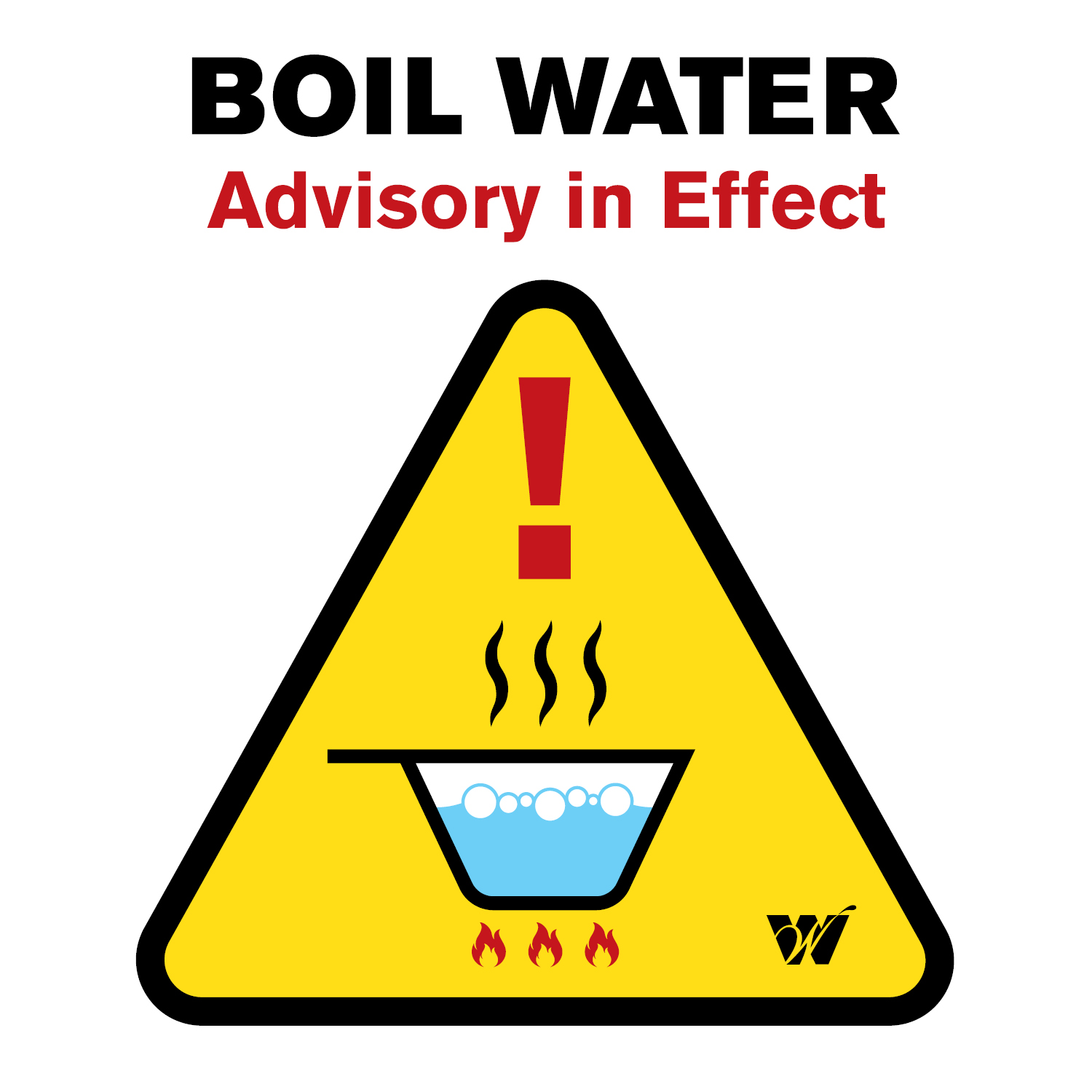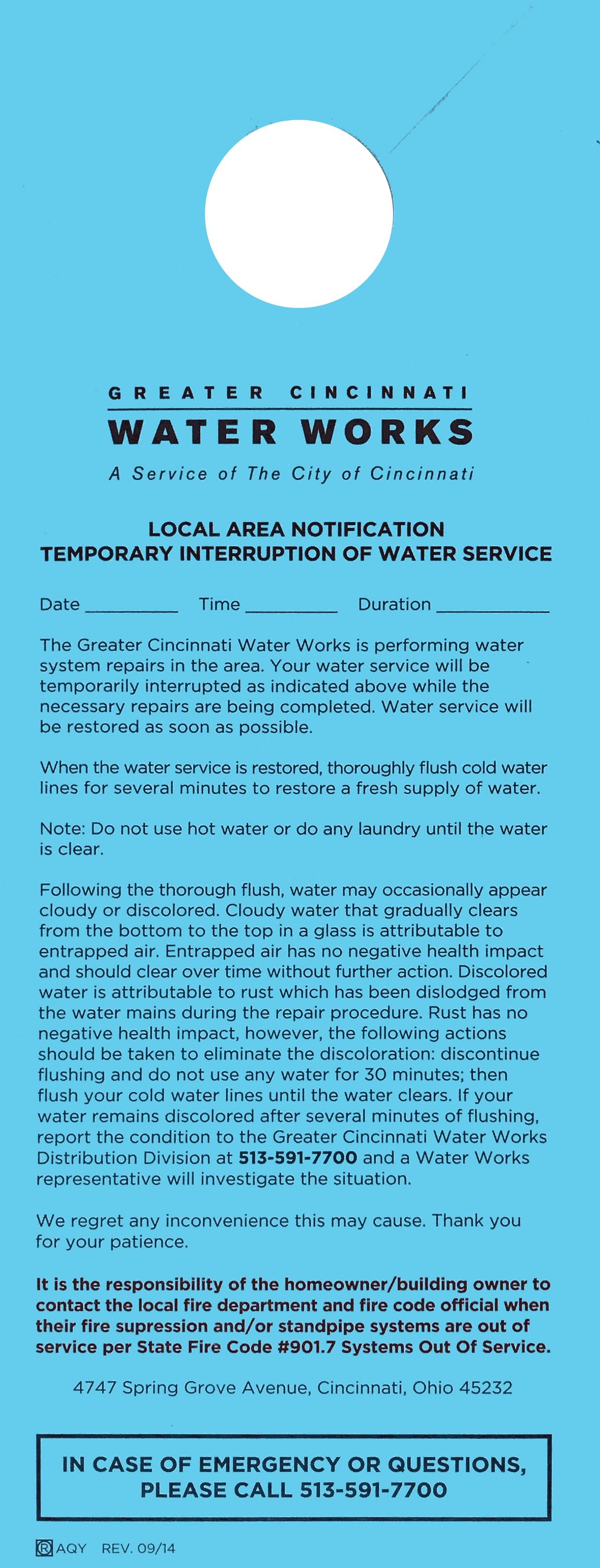Boil Water Advisories (old)
NOTE: The Boil Warter Advisory lists below are maintained during business hours. Any advisories posted to social media after business hours will not be posted here until the next business day.

A BOIL WATER ADVISORY IS CURRENTLY IN EFFECT for residents and businesses of :
| Location | Community | From | To | Ending |
|---|---|---|---|---|
WATER ADVISORIES NO LONGER IN EFFECT for residents and businesses of:
| Location | Community | From | To |
|---|---|---|---|
| ROBB ST | East End | 238 Robb St | 265 Robb St |
| AIRPORT RD | East End | 4201 Airport Rd |
If you are impacted by the Boil Water Advisory, the following two items will be placed on your MAIN FRONT DOOR AREA:
| Blue Door Hanger with information regarding Interruption of Water Service. (click image to see full size) |
Boil Water Advisory Letter with information regarding duration and instructions. (click image to see full size) |
Once water service has been restored:
- Let the water run through all taps for at least three (3) minutes.
- Bring all water to a rolling boil for at least one (1) minute, and let it cool before consuming, or use an alternative source of drinking water (such as bottled water).
- Boiled or bottled water should be used for drinking, cooking, making ice and baby formula, brushing teeth, washing dishes, and food preparation for approximately 36 hours.
- Water samples will be collected and analyzed to confirm water quality.
- If this BOIL WATER ADVISORY is extended beyond the time listed, those impacted will be notified.
Additional Precautions:
The repair or water main break that occurred in your area may also potentially cause temporary disruptions in water quality such as:
- Discolored or cloudy water
- A temporary increase in lead levels in the drinking water.
As a standard practice the USEPA recommends the following actions to restore water clarity and reduce possible lead exposure in drinking water:
- If water has not been used for several hours, run the tap until it is noticeably cooler.
- Let the water run through all taps for at least three (3) minutes before using it for drinking or cooking.
- Use cold water for cooking, drinking, and preparing baby formula.
- Boiling water will not reduce lead.
- Clean or replace your faucet filter/aerator regularly.
For additional information about lead in drinking water visit Lead.myGCWW.org, drinktap.org or www.epa.gov/safewater/lead.
GCWW Customer Service Representatives are available for questions and updates at (513) 591-7700, Monday through Friday 7:30am-5:30pm
New EPA Regulation
Recently, the Ohio Environmental Protection Agency (EPA) has enacted a new regulation (Ohio Administrative Code 3745-83-02) which will require precautionary Boil Water Advisories (BWAs) to be issued on a more frequent basis, beginning November 1, 2018. Greater Cincinnati Water Works (GCWW) is required to comply with these regulations and therefore, BWAs may be reported more frequently within the GCWW system.
Please be assured that the quality of GCWW drinking water has not diminished. GCWW continues to meet or exceed all regulations and will continue to take numerous precautions, and conduct tests to ensure the water is safe when the main is restored to service.
Communications
If GCWW issues a BWA, the immediate impacted area will be notified via door hangers. Additional information and details about BWAs and this regulation will also be provided via social media; online at myGCWW.org; and Customer Service Representatives will be available to answer questions at 591-7700.
Background
GCWW strives to produce and deliver safe, high-quality drinking water to customers and proactively maintains water system infrastructure (including but not limited to mains, pipes, pumps, and other equipment). However, in an older water system such as GCWW’s, which also must provide water service over a broad geographic area and ground elevation range, water main breaks are bound to occur. When a water main break occurs, GCWW takes numerous precautions, and conducts tests to ensure the water is safe when the main is restored to service.
BWAs are issued by public drinking water systems when conditions indicate that a main break may have resulted in a risk to water quality. Currently, GCWW does bacterial testing when a water main is put back into service, as required by the Ohio EPA. Under this requirement, GCWW has issued BWAs only a few times in the past, to isolated areas in the system.
Frequently Asked Questions
Answer: A Boil Water Advisory is advice that consumers should use boiled or bottled water for drinking, cooking, making ice and baby formula, brushing teeth, washing dishes, and food preparation -- for approximately 36 hours following the return of water service.
Answer: A Boil Water Advisory is issued when there could be a possibility that microbial contaminants could have entered the water during the water main break. It does not mean that the water is contaminated, just that it is possible. These new, PRECAUTIONARY advisories will occur following any water main break in which the operators feel there may be a chance for external contamination. The BWA is issued as a precaution.
Because GCWW has followed past Environmental Protection Agencies (EPA) regulations, taken significant precautions, and done ongoing precautionary testing, very few boil water advisories (BWAs) have been issued in the past.
Answer: YES. The BWA is issued as a precaution. The high quality of GCWW drinking water -- coming from the treatment plants, through the distribution system via the water main, and ultimately to your home -- has NOT diminished. GCWW continues to meet or exceed all regulations required for drinking water, continues to take numerous precautions, and conducts multiple tests to ensure the water is safe before and after the water main is restored to service.
Answer: Recently, (November 1, 2018), the Ohio EPA enacted regulations which will require BWA’s to be issued on a much more frequent basis. As with other Ohio water utilities, GCWW is required to comply with these regulations and therefore, issuing BWA’s will be more common.
When a water main breaks, some treated water may come in contact with outside elements such as dirt, debris, and other contaminants when the water is turned off. When water service is restored, the main is flushed to eliminate contamination; and the water is also tested to ensure there are no contaminants detected within 24 hours of water service being restored. The OEPA now requires the BWA to be issued during the time the testing is being done.
Answer: For approximately 36 hours following the return of water service, boiled or bottled water should be used for drinking, cooking, making ice and baby formula, brushing teeth, washing dishes, and food preparation.
Please follow these steps when there is a BWA in your area:- Let the water run through all taps at a full or normal flow for at least three (3) minutes (also known as “flushing”). Water flows through most fixtures at 1.5 gallons per minute.
- Bring all water to a rolling boil for at least one (1) minute, and let it cool before consuming, or use an alternative source of drinking water (such as bottled water).
Please Note: Water samples will be collected by GCWW at the location of the water main repair and analyzed to confirm excellent water quality. If the Boil Water Advisory is extended beyond the time listed, those impacted will be notified.
Answer: A notice would be posted on your property notifying you of the Boil Water Advisory and will provide specific instructions as well as an end time to discontinue the boil water activity.
If you are impacted by the Boil Water Advisory, the following two items will be placed on your MAIN FRONT DOOR AREA:
| Blue Door Hanger with information regarding Interruption of Water Service. (click image to see full size) |
Boil Water Advisory Letter with information regarding duration and instructions. (click image to see full size) |
Answer:A BWA is effective for approximately 36 hours after water service has been restored. This gives time for the laboratory testing to be completed. On the door hangar notice, the GCWW work crews will indicate when the BWA will expire. If testing indicates there is an issue with water quality, the BWA will be extended and customers will be contacted.
Answer:YES. The number of water service lines/locations requiring a boil water advisory will vary each time based on the size of the water main break and number of individual water lines impacted.
Answer:Information about Boil Water Advisories is available on this page (BWA.myGCWW.org). BWA updates will also be available by following GCWW social media sites: Follow @CincinnatiWater on Facebook& Twitter. Look for these symbols:
Answer:Yes. If a repair or water main break occurred in your area, these may also potentially cause temporary disruptions in water quality such as:
- Discolored or cloudy water
- A temporary increase in lead levels in the drinking water where lead service lines are present
As a standard practice the USEPA recommends the following actions to restore water clarity and reduce possible lead exposure in drinking water:
- If water has not been used for several hours, run the tap until it is noticeably cooler.
- Let the water run through all taps for at least three (3) minutes before using it for drinking or cooking.
- Use cold water for cooking, drinking, and preparing baby formula. (Please Note: Boiling water will not reduce lead.)
- Clean or replace your faucet filter/aerator regularly.
For additional information about lead in drinking water visit Lead.myGCWW.org, drinktap.org or www.epa.gov/safewater/lead



